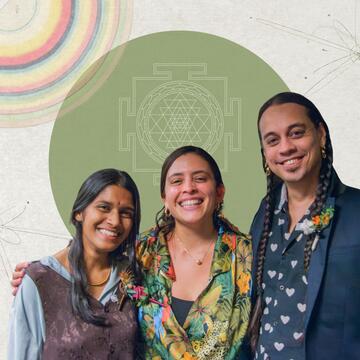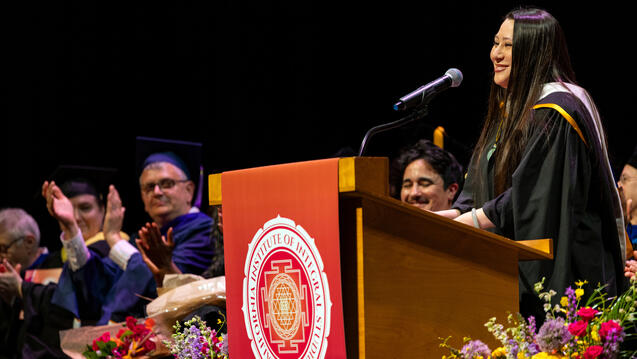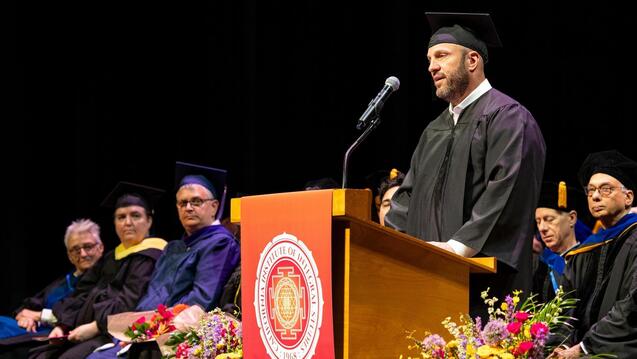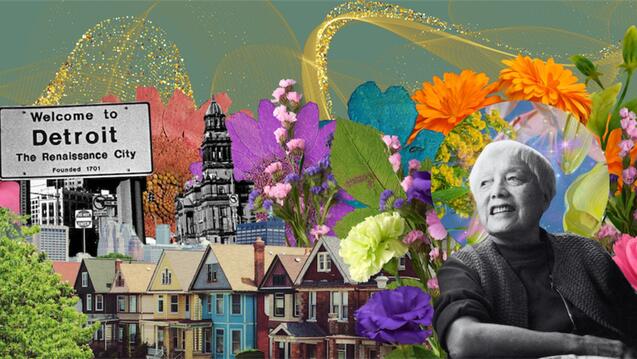Integral Counseling Psychology M.A. graduate Marissa Huang gave one of two student speeches at CIIS’ 57th Commencement Ceremony.
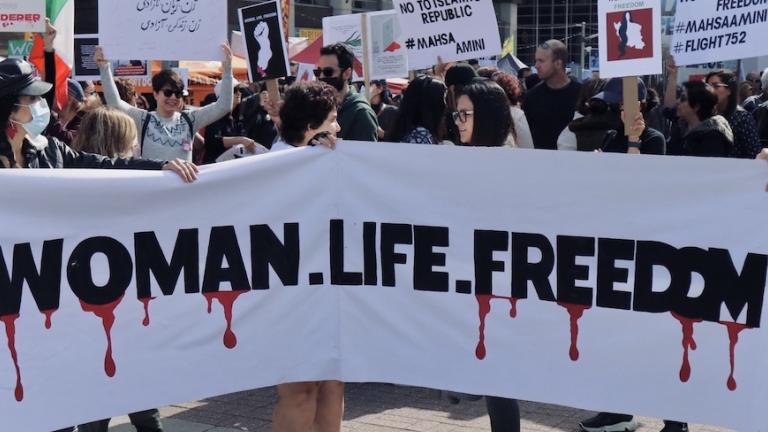
Spotlight on Iran
Integral Counseling Psychology student Erika Abrahamian educates CIIS about the Iranian protests following the murder of Mahsa Amini and her personal connections as an Iranian American.
The murder of Mahsa Amini by the current Iranian government for her alleged failure to wear her hijab to expected standards, has sparked widespread protests across Iran and across the world. The movement, led predominantly by women and students, has been crying out for regime change since September 16, 2022, the date of Amini’s death. Calls for equal rights and freedom have been met with violence and repression, but the Iranian people both in Iran and abroad, along with their allies, have continued for weeks—and now months—to demand an end to theocratic authoritarian rule.
Erika Abrahamian, a second year in the ICP program and an Immigrant from Iran, has generously offered her time to CIIS in order to share her perspective and insights as a member of the Iranian diaspora community. She discusses historical and present context for the protests, personal and generational trauma, and ways to assist.
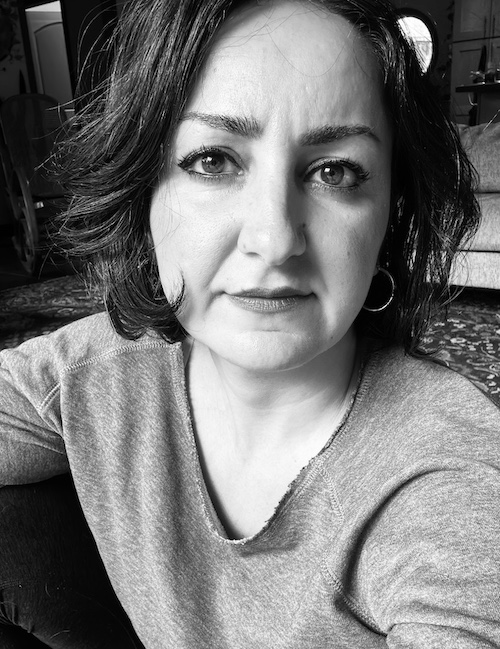
Thank you for speaking with CIIS. Can you tell us as much as you feel safe and comfortable sharing about your Iranian heritage and experience?
I was born during the 1979 revolution and spent 16 years under the regime. From the time I was two until I was ten, the war with Iraq was also happening. My upbringing — both in the internal, psychological sense, and the external societal sense — was influenced greatly by the repressive rules of the regime.
One of the laws of the Islamic Republic of Iran is that only a Muslim man can marry someone of a different faith, because [they say] a woman will automatically become whatever religion the husband is. If a Muslim woman marries someone outside the faith, she is said to be committing a sin against God and can be punished by death. My mother is from a Muslim family, though a largely secular one, and my father is Armenian Christian, also secular. The fact of my existence meant that my mother, because of the choice that she had made before the revolution in marrying my father, could be punished by death. So much of my childhood, therefore, centered around lying about this central fact of our life. Everywhere that we went I was scanning for people who might find out about us; hiding the fact that my parents were of different faith; learning to code switch, literally using different languages in different contexts. Growing up, this felt normal. We would get pulled over in the streets by armed men and we had stories prepared in case they separated us. They would take my dad aside, they would take my mom aside, and they would take me aside and they would ask us questions like, what story is your house on? And if we gave different answers, my parents would have been imprisoned, they would have been flogged. It was all arbitrary and random, yet the threat of being found out was always present.
Covering my hair when I turned nine seemed like an inconvenience compared to the larger, existential fear of death that we were faced with as individuals, to say nothing of the war with Iraq that presented a societal threat. Yet it was the only world I knew, lining up each morning at the school as the principal led us in call and response chants of “Death to America.” My parents remembered what it had been like before, and their generation was shellshocked by the loss of the country they had known and by the war. My generation was being brainwashed, thinking that this was the right way of living, although at home, our parents reminded us that what we were learning in school and on the state-run television was not who we were, was not what Iran was. You can imagine what kind of psychological difficulty that might be for a child, to have the inside and the outside be so dissonant.
I'm sharing my personal story in this moment, but I am not saying my story is unique. Every person who has left Iran at one point or another has left because this regime has in some way made their life very, very difficult. Those who have stayed have endured unimaginable hardships. There have been waves of mass arrests and mass executions any time people have protested, and people of other faiths, Jewish people and Bahai people, have been persecuted. Ethnic minorities — Kurdish and Baluch people — have been marginalized and killed in disproportionate numbers. That Mahsa Amini was a Kurdish woman for whom the whole nation has risen is a really powerful detail about this particular movement. One of the primary ways that this regime has maintained control has been by controlling women bodies, and by insisting that, were it not for unity enforced by violence, ethnic minorities like Kurds would secede. This revolution is challenging that myth by demonstrating how across Iran, people are united in demanding freedom and equality.
And now the protests and uprisings against the regime. What is it like for you to bear witness to it?
What's truly astounding about this moment is that the generation that is rising up is the Gen Z of Iran. They were born about 20 to 30 years after the revolution. Their parents don't have memories of the time before the revolution. These young people did not go through a war the way my generation did. But they were born when Internet access was available, so they knew that the life that they were experiencing was not right. That the rest of the world that they could see on their screens was free.
This uprising is awe-inspiring in the bravery that these young people have shown. They are doing things we would have never dared. We were traumatized, and because the war was happening at the same time we had a hierarchy of needs in the moment. But this generation, they're choosing freedom over their lives. They know they might be tortured or killed, and yet they have decided that freedom is worth more than suffering or death. They know full well their risks. They see their friends, their relatives get arrested and killed and tortured, and yet they keep showing up day after day.
For those of us in the diaspora, either we or our parents fled. We have a deep sense of pride in this new generation, and also deep guilt. Many of us feel shame that we didn't stand up to these people, that we allowed this to go on for 43 years by leaving. Coupled with that, there's an incredible sense of responsibility for those of us who have the privileges that we have now, wherever in the diaspora we find ourselves. I can talk to you and say, yes, publish my name, show my face, because I don't really have anything to lose; I have freedom of speech. The people on the ground there are risking their lives every day, so the least we can do is to speak up for them, to amplify their voices, to amplify their demands, and really use the privileges that we have.
What helps you to cope with or transform those feelings?
Personally speaking, the first few weeks I was frozen. I went into this passive mode of taking in the information and being overwhelmed by it and feeling completely helpless. There was a feeling of “here we go again,” having gone through the excitement of the 2009 Green Movement and the subsequent heartbreak at its failure to enact reforms. Through different modalities, therapy being one of them that really helped, I was able to understand that it's OK to have grief. But the freezing I was experiencing is a trauma response that is not useful to stay in for long. Once I was able to recognize that, I was able to act.
Action happened for me by reaching out to CIIS. It happened through talking to non-Iranians about what was going on and finding out that many people did not even know what had been happening in Iran. It happened online trying to amplify voices of people coming in, staying in contact with family and friends in Iran and relaying the bits of information to larger accounts who have more reach. And recognizing my immense privilege of being here, having good command of English, having access to institutions to amplify these voices even more than I can. Utilizing that privilege has been really helpful.
The people on the ground have slogans: “this is not the time to grieve, this is a time to fight.” They chant that at the funerals of their loved ones. Here we have the privilege of taking a break from social media and allowing ourselves to feel the grief, allowing ourselves to process the pain of not being there, as well as the collective grief and trauma of the past 43 years. I'm more effective when I give myself permission to process the grief. If I let it move through my body, when I come back to it I can act from a place of strength rather than fear or defeat. There is a really important and beautiful thing happening with social media, a sort of feedback loop between people in the diaspora and people back home. What they're experiencing comes to us and we can process it in a place of safety, we can be a grounding voice. In the same way, if our morale is high, it helps them. You can see it in the gorgeous activist art that has come out of this revolution: the call and response nature of it across borders is so very modern and unique to this moment. Now more than ever, many of us in the diaspora feel our irrepressible connection to Iran, and as painful as that connection has been, it is a source of great strength and purpose.
You also have a shared purpose, a shared vision for Iran. Can you say more about the dream you are fighting for?
The young want a secular democracy where everybody, regardless of ethnicity, race, gender, sexual orientation is included, involved protected. That gives me hope for Iran. They're daring to imagine a world that is so different than the one that exists for them. And my hope is, as they get what they're asking for, that they they're able to create a society where equality is not even questioned. Where freedom of speech, regardless of what you believe in, is protected. Where the laws that govern the society are not focused on controlling and keeping down women and minorities.
Revolutions also spread their seeds. The Green Movement in Iran in 2009 led to the Arab Spring. If this revolution, if these young people succeed, the whole region will change. And if the region changes, our world will change. This is not something that is happening over there. This is something that is very much going to impact our future generations here. Their liberation is directly connected to ours.
Revolution is not a quick process. The protests have been going on now for weeks, into months, how are you transitioning to long-term coping?
I keep reminding myself that this is a marathon, not a sprint. And I'm pacing myself so I'm able to stay engaged and involved in the long term. The biggest help for me personally has been to be in community.
When I watch these videos of people on the ground in Iran, I imagine what these traumatizing events are doing to their psyches. But what is heartening for me is that known coping mechanisms for trauma are baked into the movement. The protesters are in community. They are moving their bodies. They're chanting and using their voices. They have a clear purpose.
Those of us sitting on the outside and taking in the information need to utilize some of those factors in our day-to-day life. This means body movement, talking to other folks who are in the diaspora who are being impacted, and it means helping each other feel a sense of purpose in amplifying and educating and bringing awareness. I went to a protest rally in L.A. over the weekend, and screaming chants with a group of people who had similar grief was incredibly cathartic. The visceral impact of letting out 43 years of collective grief and pain through our voices was really, really powerful.
This is obviously a crucial time to act. What has been useful, and what will be useful to start or keep doing?
Raising the American consciousness around the issues and helping folx learn more about the history of how the US has directly caused this moment matters. The more that the average American learns, the more they can hold a fire under their elected officials to help Iran. Iran is a country of 80 million people, and poverty is high. Americans and people of other nations can put pressure on their government to stop putting blanket sanctions on Iran and start putting sanctions on specific people responsible for the violence.
I think many people are jaded about social media activism, and yet, because the Iranian government is suppressing internet use, this revolution is greatly helped by people outside Iran amplifying what is shared and getting hashtags like #MahsaAmini to trend. Many governments — Canada and Germany come to mind — have responded to public pressure by naming the Islamic Republic of Iran as a terrorist organization. They have stopped conducting business as usual with them, and have vowed to not give safe haven to the leaders and officials responsible for the ongoing human rights violations.
Erika, thank you so much for taking the time to educate us and share your experience. Readers, below are additional resources to learn more and provide assistance.
If you or someone you know is struggling as a result of these events, please reach out:
https://www.ciis.edu/student-experience/supporting-you
Accounts to follow and amplify:
@Centerforhumanrights
@middleeastmatters
@iraniandiasporacollective
Additional resources for education and context:
Community-created living resource document
https://docs.google.com/document/d/13UWXqTnp_ZVKkaf4gizBpUtvFLMlSXUl_Ux_N3iEi6Q/edit
Modern Iranian History
Amanat, Abbas. Iran : A Modern History. Yale University Press, 2017. https://ciis.on.worldcat.org/oclc/1005583110
Khosravi, Shahram. Precarious Lives : Waiting and Hope in Iran. University of Pennsylvania Press, 2017. https://ciis.on.worldcat.org/oclc/971365647
Povey, Tara, and Elaheh Rostami-Povey. Women, Power and Politics in 21st Century Iran. Taylor and Francis, 2016. http://public.ebookcentral.proquest.com/choice/publicfullrecord.aspx?p=4414703. https://ciis.on.worldcat.org/oclc/1018163637
Sameh, Catherine Z. Axis of Hope : Iranian Women's Rights Activism Across Borders. University of Washington Press, 2019. https://ciis.on.worldcat.org/oclc/1126347012
Counseling
Brown, Laura S, and American Psychological Association. Cultural Competence in Trauma Therapy : Beyond the Flashback. 1st ed., American Psychological Association, 2008. https://ciis.on.worldcat.org/oclc/176925229
Gold, Steven N. Contextual Trauma Therapy : Overcoming Traumatization and Reaching Full Potential. American Psychological Association, 2020. https://ciis.on.worldcat.org/oclc/1137182887
Miller, Geraldine A. Fundamentals of Crisis Counseling. John Wiley & Sons, 2012. https://ciis.on.worldcat.org/oclc/762325176
Related News
B.S. in Psychology graduating student Dominic Bucci delivered one of two student reflections at CIIS’ 57th Commencement Ceremony.
Last fall, Human Sexuality doctoral students and faculty members presented two panels at the National Women's Studies Association (NWSA) meetings.
